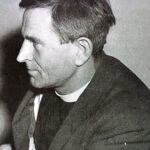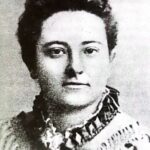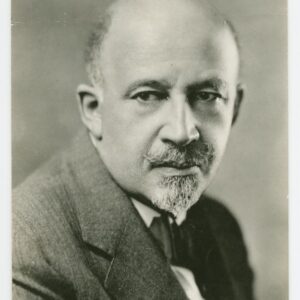
WILLIAM EDWARD BURGHARDT DU BOIS
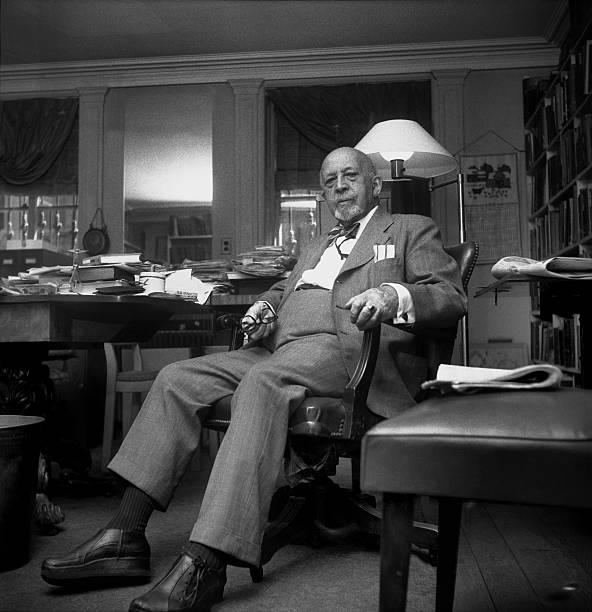
Dr. William Edward Burghardt Du Bois (February 23, 1868 – August 27, 1963) was the most outstanding of the Afro-American militant civil rights leaders at the beginning of the 20th century, and was the scholar who, in 1909, conceived the idea of an Encyclopaedia Africana.
He was born in Great Barrington, Massachusetts, of French, Dutch and Black ancestry, but identified himself with his African heritage. He was the son of Haitian-born barber, but was brought up by his mother’s family, the Burghardts, who had farmed in New England since his maternal great grandfather had been emancipated from slavery for his service in the American Revolution. He was educated at great Barrington high school, where he obtained a scholarship to Fisk University in Nashville, Tennessee, a black school, from which he graduated in 1888. He next spent four years at Harvard University, first studying philosophy under such teachers as William James (1842-1910) and George Santayana (1863-1952) and obtaining his A.B. in philosophy in 1890, and then pursuing graduate studies in political economy and History. In 1892 he won a fellowship to Berlin University and found that in Europe he received better treatment from whites than in the United States. At this time, he also travelled to Switzerland, Italy and Austria-Hungary. He received his Ph.D. from Harvard – the first black man to obtain a Harvard doctorate – for his thesis on “The suppression of the African Slave Trade to the Unites States of America, 1638-1870.” His thesis was published in 1896 as the first monograph in the Harvard Historical Series.
On leaving Harvard, he had been appointed professor of classics at Wilberforce University in Ohio. He left in 1896 for the University of Pennsylvania, where he turned to Sociology – thus becoming the first black sociologist in the United Studies. In 1897, he was appointed director of Negro Studies at Atlanta University, Georgia, where he spent the years until 1910 writing scholarly works, engaging in political propaganda, and participating in humanitarian projects. He published a number of sociological research studies, including The Philadelphia Negro: a social study (1899). He refused to accept the inferior role which white Americans had mapped out for blacks, and which had been accepted by Booker T. Washington (1856-1915), the leading spokesman for black Americans at that time. He stressed that the ‘talented tenth’ of black Americans should be encouraged to compete with whites in all fields of study, and not in industrial education alone, and he also bitterly opposed racial segregation. His book, The Souls of Black Folk (1903), aimed at interpreting blacks to white Americans.
He attended the Paris Exposition of 1900, and in the same year participated in the first Pan-African Conference, held in London from July 23-25 under the sponsorship of a Trinidad lawyer, Henry Sylvester-Williams. His particular interest in Africa and Africans dates from this time.
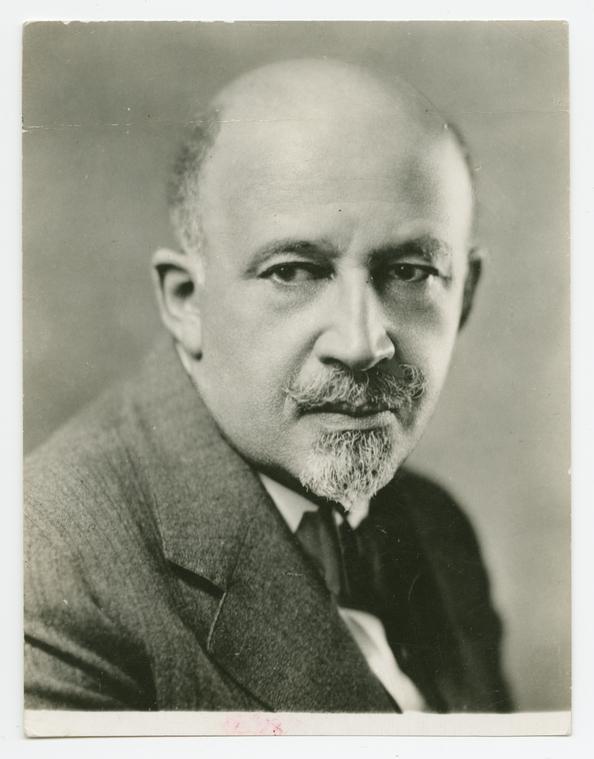
After his return to the United States, he initiated the Niagara movement (1905-1910), a forerunner of the National Association for the Advancement of Coloured People (N.A.A.C.P), which called for full political, civil and social rights for black Americans. Du Bois was the movement’s executive secretary. Its greatest success was achieved from 1905-1907, but it later encountered financial difficulties, and suffered from poor organisation, and quarrels among the directors.
In the elections of 1908, Du Bois supported the Democratic Party, because he felt that the Republicans did not deserve the votes of black Americans. Thereafter he became a convinced socialist.
By 1910, he was at a turning point. His plan for black self-help had failed, and a magazine he had founded in 1907, Horizon, faced financial ruin. He had also alienated the white philanthropists who supported Atlanta University. But after the Niagara Movement merged with a group of white liberals to form the N.A.A.C.P. in 1909, he became editor of the new organisation’s publication, The Crisis, in 1910, continuing to hold the editorship until 1934.
He used The Crisis to disseminate his political views, to the embarrassment of the N.A.A.C.P’s directors. He worked for the N.A.A.C.P. as joint secretary, together with Felix Alder of the American section of the World Races Congress, which had been held in London in 1911, and which Du Bois had attended. In the First World War (1914-1918), he supported the Allies against Germany, and urged that black Americans should be given a chance to serve in the United States Army. His desire to see Africa take its rightful place among the nations of the World had led him to suggest in 1917 the formation of a new African state formed from the territories of the German Colonies, and from the Belgian Congo. In 1918 he also suggested that, if possible, Uganda, French Equatorial Africa, Angola and Mozambique should be added to them. The N.A.A.C.P. adopted this view before the conclusion of the Treaty of Versailles in 1919. Earlier, in 1918, Du Bois had also written to President Woodrow Wilson (Term of office, 1913-1921) to complain that his policy of self-determination for all men was not being applied to black Americans in state and national legislatures in the United States.
After the Armistice in 1918, which ended the fighting in World War I, with the aid of Blaise Diagne, a Senegalese deputy who was the most influential colonial politician in France, Du Bois was able to persuade George Clemenceau, premier of France from 1917-1920, to agree to the holding of what Du bois called the Pan-African Congress in Paris in 1919. (While Du Bois and his contemporaries called the congresses, held under his inspiration between 1919 and 1945, as the First to the Fifth Pan-African Congresses, it is now customary to recognise the 1900 conference as constituting the original Pan-African congress in the series, and to refer to the subsequent assemblies as the second (1919) to the sixth (1945), a usage which is followed in this dictionary). The delegates, who included only 12 Africans, adopted Du Bois’ plans for Africa. The success of this conference led him to organise two more – a third, which was held in London and Brussels in 1921, and a fourth, which was held in London and Lisbon in 1923 – but he met with less encouragement from both Africans and Europeans than he had received at the outset.
The economic, social and political upheavals caused by World War I led the European nations to oppose any group which wanted to abolish colonialism. The British, French, and Belgian governments were suspicious of the intentions of Du Bois’ Pan-African movement, which they confused with the “Back to Africa” movement of Marcus Garvey (1887-1940), the charismatic Jamaican who had fired the imagination of black Americans. Du Bois had first met Garvey in Jamaica in 1915, and had admired his vision and organisational ability. But he warned Garvey’s friends in the columns of “The Crisis” against supporting his grandiose commercial schemes which he felt would fail. His warnings were ignored until Garvey failed and was deported from the United States in 1927. Meanwhile, Du Bois was appointed as Minister Plenipotentiary to Liberia, where he became the dean of the diplomatic corps, and represented the U.S. President Herbert Hoover (term of office 1929-1932) at the second inauguration of Liberian President Charles King. Curiously enough, however, Du Bois excused slavery in Liberia, which involved the shipping of Liberians to Fernando Po, and brought about the resignation of President King in 1931.
Meanwhile, the Fifth Pan-African congress had been held in New York in 1927, as a gesture to keep the movement alive. A Sixth was planned to be held in Tunis in 1929 but was vetoed by the French government. The Sixth was to be held in Manchester, England, in 1925.
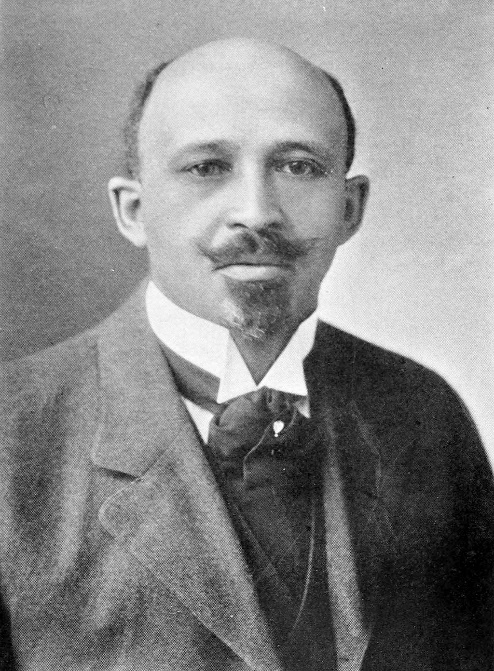
Between the two world wars, Du Bois advocated socialism and watched the progress of the Soviet Union with keen interest, gradually becoming her supporter. But by temperament he was not suited to become a socialist leader of the black masses of the United States, while American Communists regarded him as a tool of the very same white liberals who, by 1930, had rejected him. Between 1930 and 1940, he advocated self-reliance for black Americans, and the formation of an autonomous black American community, an approach which foreshadowed the militant separationist movement of the 1960s. As early as 1911 he had tried to make Black Americans proud of their race, when he had started a children’s magazine for this purpose, but he made claims for Africa and Africans that were not always based on fact. He urged black college students to be more militant and to reject the paternalism of white liberals and was delighted with the black student revolts at Fisk and Howard Universities in the 1930s. But his acceptance of segregation led to the resignation from the N.A.A.C.P and his return to Atlanta University.
From 1934-1944, he worked at Atlanta, where his great prestige won him several honorary degrees as well as membership in the National Institute of Arts and Letters. He wrote two books, in 1940 and founded Phylon, a quarterly review about race and culture, and began work on a projected Encyclopedia of the Negro, of which the preparatory volume, co-authored with Professor Guy B. Johnson, was to be published in 1945.
In 1936, he studied in Nazi Germany, whose racial policies he detested and also visited the Soviet Union, China and Japan. These visits still further increased his interest in the problems of the coloured races. His hatred of the white race led him to advocate a strong Asia led by Japan, whose excesses in China he was prepared to excuse.
His contract with Atlanta University was abruptly ended in 1944, probably because of his uncompromising stand on racialism in Plylon. He was immediately appointed director of research by the N.A.A.C.P. He was a consultant to the United Nations when it met at San Francisco in 1945, and edited a petition entitled an “An appeal to the World,” asking for equal treatment for black Americans, for presentation to the Commission for Human Right. He arranged the Sixth Pan-African Congress with Kwame Nkrumah (q.v) (1909-1972), later the first president of Ghana and George Padmore (q.v) [1903-1959], the Trinidad author, as joint political secretaries. The Congress, which inter alia advocated an international bill of rights which would specifically include colonial peoples, was the most successful of the five, and was attended by a number of Africans who were later to become prominent in their home countries. During the 1948 Presidential elections in the United States, he supported Henry A. Wallace (1888-1965), the Progressive Party candidate, but later after the elections abandoned Wallace when he backed United States armed intervention in Korea in 1950.
Du Bois was dismissed from the N.A.A.C.P. in 1948 for attacking its policy of support for the administration of President Harry S. Truman (Term of office, 1945-1952). He was immediately appointed to the Marxist-oriented Council on African Affairs in New York. Between 1949 and 1950 where he crusaded for peace. He attended the Cultural and Scientific Conference for World Peace in New York in 1949, the World Peace Congress in Paris, France in April, 1949, and planned, with American chemist Linus Pauling (later to be awarded the Nobel Peace Prize), and others, the American Continental Congress for World Peace to be held in Mexico City in July 1949. But Du Bois could not attend the Mexico conference, because he chose instead to attend the All Soviet Peace Conference in Moscow in August 1949. In 1950 he established the Peace Information Center in New York, and the centre’s activities led to his being charged with being ”an agent of a foreign principal.”
He was arrested and charged, with three other officers of the Peace Information Center in New York, then on the point of winding up its activities, but was acquitted and discharged in November 1951. His trail embittered him, and he ceased to play an active part in the struggle for equality for black Americans.
In 1961, he joined the Communist Party, and left the United States for Ghana at the invitation of President Nkrumah (term of office, 1960-1966). Du Bois became a Ghanaian citizen, and was the first director of the Encyclopaedia African project, which was his life’s greatest ambition but which was not to be realised in his lifetime. He was elected a Fellow of the Ghana Academy of Arts and Sciences in 196, and was awarded a doctorate in Literature by the University of Ghana in 1963. He died in Accra on August 27 of the same year, and was buried near Christiansburg Castle. He bequeathed a portion of his library to the Encyclopaedia Africana Secretariat, and a portion to Fisk University.
Du Bois was an innovative scholar with a high sense of social justice. Throughout his long life, he wrote a number of books of different kinds, including novels, most which were concerned with the status and destiny of black peoples. He was a pioneer in African studies in the United States. As a colleague he was uncooperative, and one who insisted on having his own way. His arrogance and his intolerance of cant made him several enemies. But most of his radical ideas had, by the later 1960s, became commonplace in the United States, and even his enemies will admit that he was a prophet of the black revolution who was in advance of his age.
L. H. OFOSO-APPIAH
